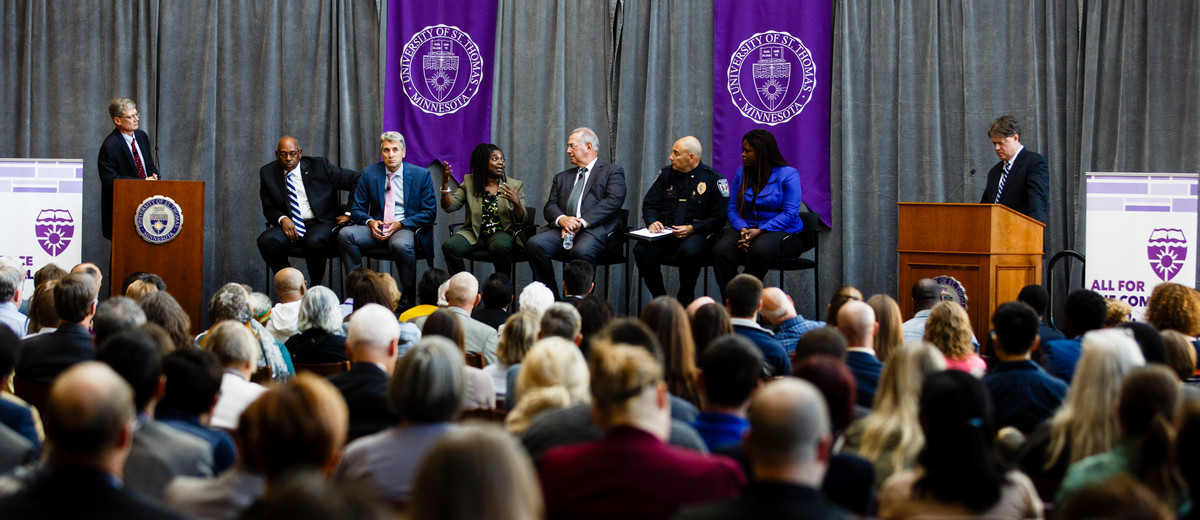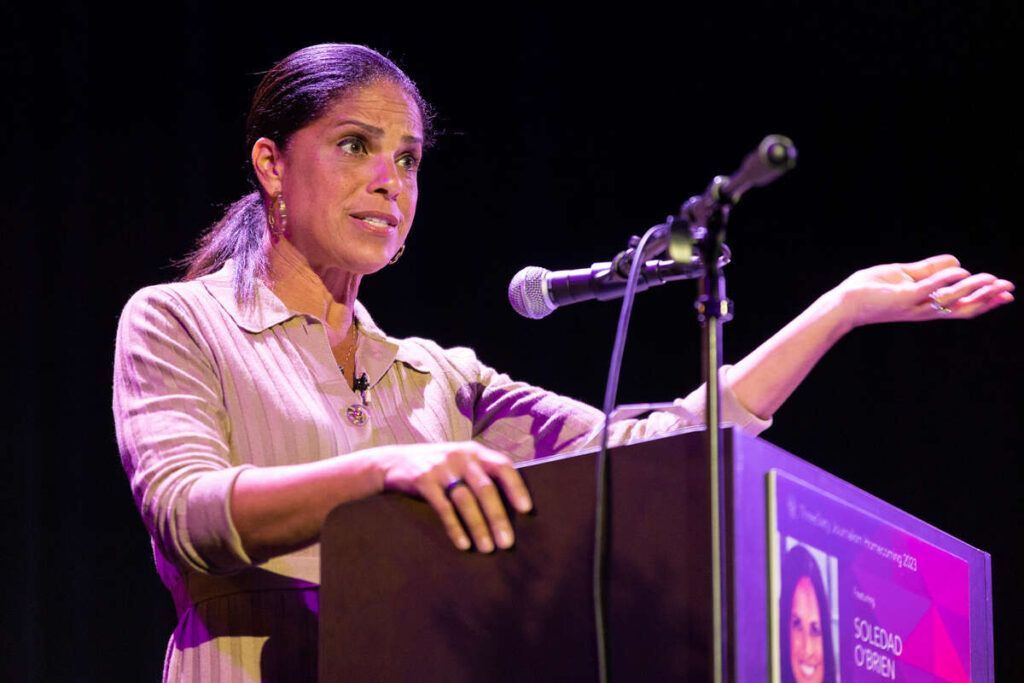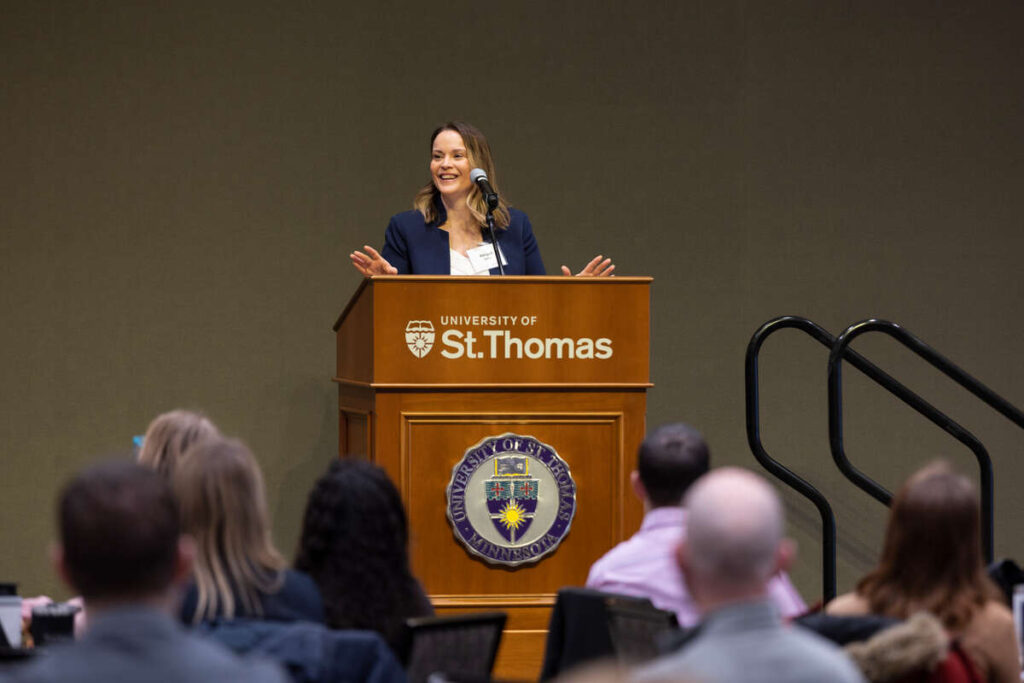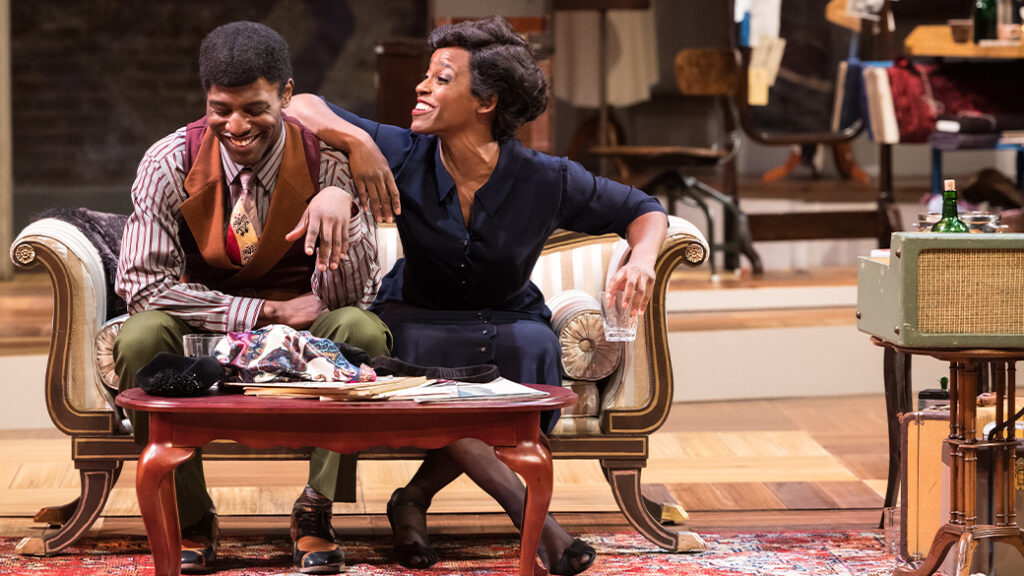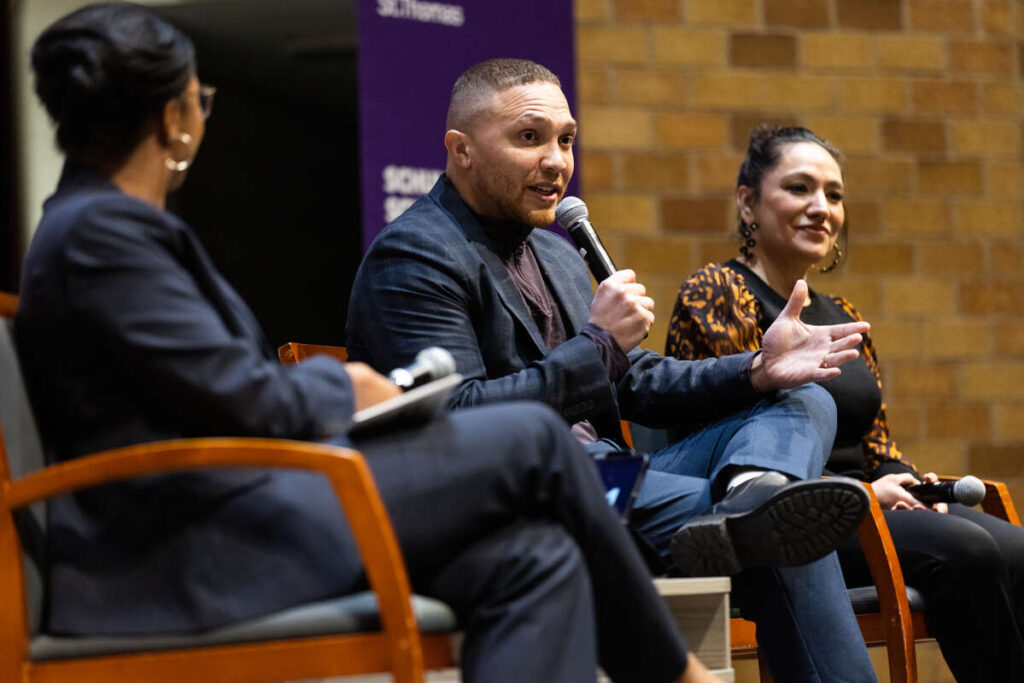It's been a rough year. In the last few months, five police officers were killed in Dallas, and closer to home, Jamar Clark and Philando Castile were killed by law enforcement officers. Sometimes it’s hard to find common ground when tensions run high. To address the sometimes contentious relationship between police officers and people of color, the University of St. Thomas School of Law held a forum Sept. 14.
“Finding Common Ground Between Public Safety and Racial Justice – All for the Common Good” was a candid and civil dialogue among six panelists that sought to build bridges across differences and promote community engagement.
Robert Vischer, dean of the School of Law, introduced the panel, saying, “It’s vitally important that St. Thomas be a champion for these kinds of conversations. We’re here to listen and learn from each other, not to reach consensus.”
Here are five observations from the discussion.
These issues have been going on a long time
The deaths of Clark in Minneapolis and Castile in Falcon Heights are recent incidents that have brought injustices to the forefront; however, social injustice issues have plagued America since its founding.
Nkechi Taifa, advocacy director for criminal justice at Open Society Foundations, said that much of the tension between law enforcement and communities of color is rooted in the past during the “slavery era of containing and restraining African-Americans who tried to assert their rights. Although the players change, the script remains the same. Black people have been subjected to a double standard of justice. A system of inequality. To ‘control, contain and restrain’ continues.”

Nkechi Taifa, advocacy director for criminal justice at Open Society Foundations
To resolve some of these issues, Minneapolis NAACP President Nekima Levy-Pounds offered, “We have to unpack the systemic issues that have led to this in U.S. and in Minnesota. We have a significant problem in the way that police interface with people of color.” Levy-Pounds is a former professor and co-founder of the Community Justice Project at the School of Law.
Police chief Michael Goldstein noted that in his Plymouth precinct, the officers practice servant leadership and they face a myriad of tasks. “Responding to 911 calls, officers never know what they’re going to face. Split-second life-saving decisions must be made,” said Goldstein, who holds bachelor’s and master’s degrees from St. Thomas.

Plymouth chief of police Michael Goldstein
We all want the same thing
Most Americans share some common values, such as wanting safe neighborhoods, good schools and opportunities for economic success.
“We want a nation that’s great for everyone,” said Cedric Alexander, CNN law enforcement analyst, member of the White House Task Force on 21st Century Policing and director of public safety for DeKalb County, Georgia. “We share more similarities than differences.”

Cedric Alexander, CNN law enforcement analyst, member of the White House Task Force on 21st Century Policing and director of public safety for DeKalb County, Georgia
The panelists agreed that for civil dialogue, people need to share those commonalities in their conversations with others, instead of focusing on what divides them.
Although there was disagreement about the effectiveness of the police presence in North Minneapolis, public safety officers Alexander and Goldstein emphasized that police officers are part of the community and must not be apart from it.
“It’s about partnerships. As a nation, we’re only as strong as our partnerships,” Alexander said.
Everyone has biases
Talking about race is difficult because it depends on one’s experiences. Because everyone has inherent biases, the panelists urged the audience to understand other perspectives and the privilege of race.

Former Minneapolis mayor R.T. Rybak
“My experience was that I was a white kid growing up in a middle-class neighborhood,” former Minneapolis mayor R.T. Rybak said. His family owned a store that served mostly customers who were people of color. When he became Minneapolis mayor in 2002, he noticed that two communities – the LGBT community and people of color – were not treated as equally as others. “We progressed in our relationships with gays and lesbians but relatively little progress was made with the African-American community. That shows me that race matters in this discussion,” he said.
“Changing the attitudes of 800 police officers will take time,” Hennepin county attorney Michael Freeman said. “Let’s look to the future, not the past.”

Hennepin County attorney Mike Freeman
More training and education may benefit officers
Public safety officers receive extensive training and when push comes to shove – when they arrive on a scene – they use their own discretion to figure out what’s going on and what action is warranted.
As Taifa said, “Officers use discretion, so it’s very important that they’re trained. The police officer on the street has much more discretion than the police officer in the office and that’s not right.”
Levy-Pounds said, “I have seen a police officer grab a child around 10 years old by his shirt and slam him on a police car. I confronted the officer and he said ‘Ma'am, you don’t know what this kid did.’ Police are taking matters into their own hands.”
Later, she added, "We know there are good cops out there. But when we talk about police misconduct, they get defensive. If a cop witnesses misconduct and writes a false report, that is not a good cop."

President of the Minneapolis NAACP Nekima Levy-Pounds
Public safety officers sometimes risk their lives when they enter communities known for violence. Alexander suggested that those kinds of stressful situations take their tolls on officers. “We want to make sure they’re healthy,” he said. “We need to hold bosses and supervisors responsible for what happens on the street."
While Minnesota is the only state that requires police officers to complete a college degree, and the training is more advanced than most states, according to Goldstein, the panelists agreed that more training and education were needed.
Officers are trained in de-escalation techniques and other useful skills, but, as Rybak said, “People call 911 with a problem. Police officers are the only 24-hour social service agency available.” And officers could use more training for those situations. He pointed out that after 9/11, “all the resources that police had were eviscerated and the funds were shifted to homeland security.”
Communication is the key to moving forward
The panelists agreed that mutual respect and listening were two necessities to understanding other perspectives and overcoming barriers in communication.
“I did not grow up poor but does that mean I can’t understand? I need to listen and validate what people feel. That’s what’s important,” Alexander said.
The panelists expressed gratitude for being part of this important conversation at the School of Law.
“I hope we can take these conversations to provide a better future than today,” Goldstein said.
The event was co-sponsored by the Holloran Center for Ethical Leadership in the Professions and the Terrence J. Murphy Institute for Catholic Thought, Law, and Public Policy at the University of St. Thomas. Two School of Law professors moderated the event: Hank Shea, senior distinguished fellow at the School of Law and fellow of the Holloran Center for Ethical Leadership in the Professions; and Mark Osler, Robert and Marion Short Distinguished Chair in Law.
